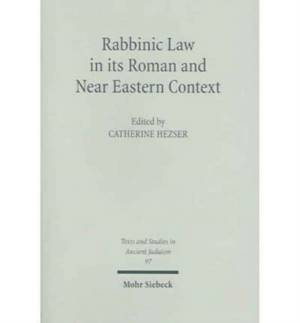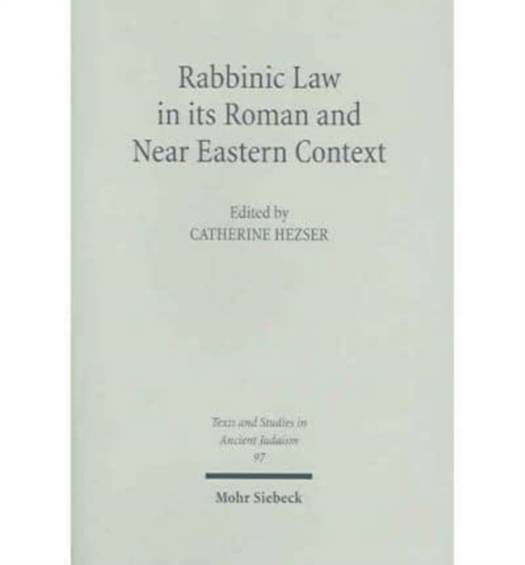
- Afhalen na 1 uur in een winkel met voorraad
- Gratis thuislevering in België vanaf € 30
- Ruim aanbod met 7 miljoen producten
- Afhalen na 1 uur in een winkel met voorraad
- Gratis thuislevering in België vanaf € 30
- Ruim aanbod met 7 miljoen producten
Zoeken
Rabbinic Law in Its Roman and Near Eastern Context
Hardcover | Engels | Texte und Studien zum Antiken Judentum / Texts and Studies in Ancient Judaism TSAJ | nr. 97
€ 114,95
+ 229 punten
Omschrijving
Ancient Palestinian and Babylonian rabbinic literature developed in a context of constant exposure to and challenge by the dominant Graeco-Roman and Babylonian cultures. Rabbinic legal thinking is unlikely to have constituted an exception in this regard. Yet the positivistic search for influences is increasingly seen as inappropriate in recent scholarship. What is much more important is to investigate the ways in which rabbinic legal thinking participated in ancient Graeco-Roman and Near Eastern legal thinking, to determine which legal topics and forms were shared, where similar conclusions were reached, and where differences can be discerned. In this way the boundaries between ancient Jewish and non-Jewish legal traditions become increasingly blurred.The contributions to this volume, which is the outcome of an interdisciplinary conference held at Trinity College Dublin in March 2002, address a variety of issues. Both internal and external aspects of legal texts are investigated, documentary texts are discussed alongside literary texts, and the Graeco-Roman context of Palestinian legal traditions is supplemented by the Sasanian context of Babylonian halakhah. In addition, the general legal situation in the Roman Empire at large and Roman Palestine in particular is elucidated.
Specificaties
Betrokkenen
- Uitgeverij:
Inhoud
- Aantal bladzijden:
- 310
- Taal:
- Engels
- Reeks:
- Reeksnummer:
- nr. 97
Eigenschappen
- Productcode (EAN):
- 9783161480713
- Verschijningsdatum:
- 31/12/2003
- Uitvoering:
- Hardcover
- Formaat:
- Genaaid
- Afmetingen:
- 153 mm x 229 mm
- Gewicht:
- 566 g

Alleen bij Standaard Boekhandel
+ 229 punten op je klantenkaart van Standaard Boekhandel
Beoordelingen
We publiceren alleen reviews die voldoen aan de voorwaarden voor reviews. Bekijk onze voorwaarden voor reviews.










